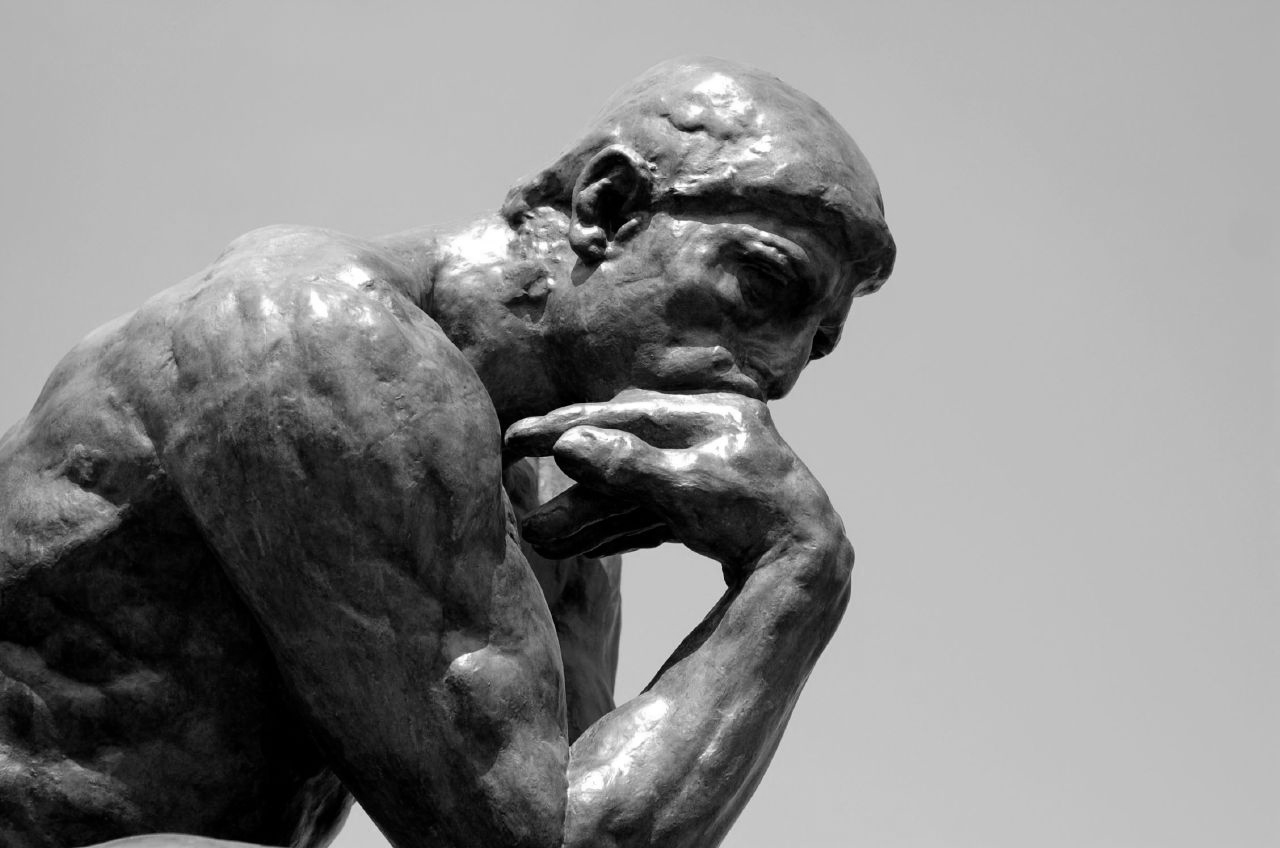Proof: Philosophical Knowledge
Photo credits: Unknown | CC0
Introduction
This page highlights philosophical logic that points to some kind of God, although philosophy by itself cannot determine which God that is. For that, we need historical evidence and reasoning.
Messages and Resources on Philosophical Knowledge
Part 9: What’s the Right Thing to Do? And How Do We Know? looks at why and how Saruman tried to perform utilitarian calculations, while Gandalf received a morality from higher than himself. This episode explores why the heroes believed they needed to commit "folly." They knew they had to try to destroy the Ring. They knew they had to march on Mordor despite overwhelming odds. They knew they had to pity Gollum. The story shows us the big difference between a received (deontological) moral vision vs. a utilitarian calculation of ends and means.
Part 11: How Pagan Virtue Ethics Opens Up to Christian Faith, Hope, and Love shows how the noble pagan search for virtue ethics was a precursor to Christian love, hope, and faith. The Hobbits grow in love: from mere loyalty to the Shire to sacrificial love for all. Eowyn grows in hope: from hoping for a glorious death in battle to hoping that life and love will outlast death and violence. Finrod, and perhaps Andreth too, grow in faith: to believe that Eru must enter into Arda to heal the Marring.
This presentation is relevant to Proof: Love must relate to all humanity, not just our favorite humans, for what gives us the moral authority to limit a virtue like love? Hope of any sort must be founded on evidence. Faith must offer historical and not just literary data to be evaluated.
00:06:43 Pippin and Merry Grow in Love
00:27:00 Eowyn Grows in Hope
00:40:49 Finrod and Andreth Grow in Faith
01:27:40 How Do We Know?
The Trinity: Can Other Gods Be Personally Known?
God is immanent and locatable; God is transcendent and not contained by His appearance; and God is the link between them. This is what makes God personally knowable.
Why Question Atheism from a Political, Historical, and Moral Perspective?
Slides to a presentation surveying the origins of modern Atheism, as connected to nation-building and Enlightenment political philosophies: racist liberal democracy and Marxist collectivism.
Evil and the Christian God and Theology of Atonement
This paper explores how the character of God drives the type of story one lives in, and the type of atonement required to be consistent. Although penal substitutionary atonement makes God complicit with human evil, medical substitutionary atonement understands God as giving God’s whole self to undo human evil in human nature in a loving way: with our partnership. This means God is wholly good and loving, without being actively or passively evil. This means that the Christian story is truly a happy ending story, where good triumphs over evil without becoming evil itself. Evil and the Christian God is a shorter version of the paper.
The Limitation of Philosophy: A Letter to a Friend Who Asked Whether Christian Ethics are Rational
A friend asked why Christian ethics, even properly understood, must simply be received unchallenged. He argued for utilitarian ethics instead. We explored the difference between deontological vs. utilitarian ethical systems, how Tolkien’s The Lord of the Rings is a helpful exploration of that difference, why ethics can neither prove nor disprove belief systems in general, but why internal coherence and historical epistemology supports Christian faith and ethics.
Human Dignity: Does Every Individual Matter?
A long essay arguing that science, philosophy, existentialism, and other belief systems do not support the view that every human being matters; only a robustly Trinitarian Christian faith anchored in the patristic formulation of medical-ontological atonement can. A 30 - 40 minute read.
The Anastasis Center blog post, Apr 28, 2016, on the Fall and the exile from the Garden. Neuroscientists currently observe that “karmic justice” or meritocratic-retributive justice is the default setting of the most primitive part of our brain. But restorative justice broadly works, even though it requires us to have empathy for even offenders and hope for personal repentance and change. Not only does this become a pastoral challenge, it is an argument against penal substitutionary atonement.
Desires, Beliefs, and How We Know Truth: Why Do We Sometimes Not Desire Jesus?
A presentation about how human desire for life, beauty, goodness, love, and justice is suggestive but needs help, and how belief systems present ways of interpreting our desires and also theories of authentication.
Other Resources on Philosophy and Christian Faith
Philosophy of Religion, Problems with Divine Omniscience. Philosophy of Religion. Freedom and Foreknowledge. Philosophy of Religion.
C.S. Lewis, Mere Christianity. Harper San Francisco | Amazon page, originally 1944-5.
Michael Polanyi, Personal Knowledge: Towards a Post-Critical Philosophy. University of Chicago Press | Amazon page, Aug 15, 1974. See also a summary of his Critical Realist Epistemology
James Kelly Clark, Return to Reason: A Critique of Enlightenment Evidentialism, and Defense of Reason and Belief in God . | Amazon page, Mar 22, 1990.
Peter Kreeft and Ronald Tacelli, Handbook of Christian Apologetics. InterVarsity Press | Amazon page, Apr 22, 1994.
Charles Taylor, Overcoming Epistemology . From Philosophical Arguments, 1995.
Susan Moller Okin, Is Multi-Culturalism Bad for Women? Boston Forum, Oct 1, 1997.
Etienne Gilson, The Unity of Philosophical Experience. Ignatius Press | Amazon page, Oct 1999. On the advent and demise of philosophical systems in the West.
Alvin Plantinga, Warranted Christian Belief. Oxford University Press | Amazon page, Jul 27, 2000.
Lee Strobel, The Case for Faith: A Journalist Investigates the Toughest Objections to Christianity. Zondervan | Amazon page, Sep 26, 2000.
Etienne Gilson, God and Philosophy. Yale University Press | Amazon page, Mar 1, 2002.
Esther Lightcap Meek, Longing to Know: The Philosophy of Knowledge for Ordinary People. Brazos Press | Amazon page, Jul 2003. See also review by John M. Frame, Review of Esther Meek’s Longing To Know. Frame-Poythress, May 24, 2012. “Her epistemology follows that of Michael Polanyi pretty closely, but her book is not a study of his work. She doesn’t quote him or analyze his writings… Meek starts, not with “knowledge” as an abstraction, but with concrete acts of knowing, “epistemic acts” that we perform every day. (She hints, but doesn’t quite say, that we should jettison the traditional definition of knowledge as “justified, true belief.”) She defines “knowing” as “the responsible human struggle to rely on clues to focus on a coherent pattern and submit to its reality.” The book takes up each clause of that definition consecutively.”
Pope Benedict XVI, Faith, Reason, and the University. Sep 12, 2006.
Kenneth Feinberg, What is the Value of a Human Life? NPR May 25, 2008.
Etienne Gilson, From Aristotle to Darwin and Back Again: A Journey in Final Causality, Species, and Evolution. Ignatius Press | Amazon page, Sep 30, 2009.
N.T. Wright, Simply Christian: Why Christianity Makes Sense. HarperOne | Amazon page, Feb 9, 2010.
Francis Collins, Belief: Readings on the Reason for Faith. HarperOne | Amazon page, Mar 2, 2010.
Jilllian Becker, Against God and Socialism. The Atheist Conservative, Apr 29, 2011. “It is human nature to be selfish… Christianity and Communism require human nature to change.”
Nicholas Lash, All Good Reasoning Proceeds from Prior Commitments and Beliefs. The Guardian, Jul 1, 2011.
John Gray, The Knowns and the Unknowns. The New Republic, Apr 20, 2012. A review of Jonathan Haidt's intuition model of morality
Samuel McNerney, The Irrationality of Irrationality: The Paradox of Popular Psychology. Psychology Today, Apr 27, 2012.
George Dvorsky, 8 Great Philosophical Questions We'll Never Solve. io9, Sep 24, 2012.
Matt Dillahunty and Hans Jacobse, The Source of Human Morality: An Atheist and an Orthodox Priest Debate. video, Feb 20, 2013.
U.K. Chief Rabbi Jonathan Sacks, Atheism Has Failed. Only Religion Can Defeat the New Barbarians. The Spectator Magazine, Jun 15, 2013.
Christine Gross-Loh, Why Are Hundreds of Harvard Students Studying Ancient Chinese Philosophy? The Atlantic, Oct 8, 2013.
Chris Arnade, The People Who Challenged My Atheism Most Were Drug Addicts and Prostitutes. The Guardian, Dec 24, 2013.
Adam Gopnik, The People Who Pass: Pickpockets and Paranoia in France. New Yorker, Jan 13, 2014. Has a great explanation for why Enlightenment political philosophy leads to nationalism and the ill-treatment of certain minorities
Michael Ruse, The God Decision: Is It Wrong to Teach Your Children About God? Aeon, Feb 3, 2014.
Gary Gutting, Is Atheism Irrational? An Interview With Alvin Plantinga. New York Times, Feb 9, 2014.
We Don’t See Things As They Are, We See Them As We Are. Quote Investigator, Mar 9, 2014.
The Onion, Expectant Parents Throw Some Values Together at Last Minute. The Onion, Mar 10, 2014.
John Gray, Was Nietzsche Right About Religion? The Ghost at the Atheist Feast. The New Republic, Mar 21, 2014.
John Gray, Captain America's Moral Philosophy. The New Republic, Apr 2, 2014.
Michael S. Roth, Young Minds in Critical Condition. New York Times, May 10, 2014.
WBEZ, Is This Working? This American Life, Oct 17, 2014. About no general agreement about how teachers should discipline kids.
Emma Green, The Cold Logic of Drunk People. The Atlantic, Oct 27, 2014.
Kevin Diller, Theology's Epistemological Dilemma: How Karl Barth and Alvin Plantinga Provide a Unified Response. InterVarsity Press | Amazon page, Nov 24, 2014.
Paul M. Hughes, Forgiveness. Stanford Encyclopedia of Philosophy, Dec 23, 2014.
Prayson Daniel, Kierkegaard: Subjectivity is Truth. blog, Jan 19, 2015.
Justin P. McBrayer, Why Our Children Don’t Think There Are Moral Facts. New York Times, Mar 2, 2015.
Nancy Hill, Can We Have Martin Luther King's Dream Without His Faith? Veritas Forum, May 8, 2015.
David Niose, Anti-Intellectualism is Killing America. Psychology Today, Jun 20, 2015.
Jamilah Lemieux, Trying to Forgive the Black Church: Dylann Roof Can’t Have My Mercy, But I Can Try to Make Peace With Black Christianity. The Nation, Jul 2, 2015. shows how forgiveness is an ethic in search of a home, and is both intuitive and counter-intuitive
David Cayley, Craig Calhoun, Rajeev Barghava, The Myth of the Secular. CBC Radio, Jul 2, 2015. Part 6 features John Milbank and Radical Orthodoxy,
John Gray, A Point of View: Is It Ever Right to Try to Create a Superior Human Being? BBC Magazine, Sep 6, 2015.
Timothy Sandefur, How Star Trek Explains the Decline of Liberalism. The Federalist, Sep 15, 2015.
William Irwin, How to Live a Lie. New York Times, Nov 2, 2015. Argues we can believe God, morality, and free will exist even when "we know they don't exist."
Dustin Messer, The Foolishness of Stephen Colbert. Mere Orthodoxy, Nov 20, 2015.
David Byrne, How Progressives Stole Christian History. Crisis Magazine, Dec 16, 2015.
Glenn M. Harden, The Sex Trade, Evil, and Christian Theology. InterVarsity Press | Amazon page, Apr 7, 2016.
Robert Epstein, The Empty Brain. Aeon, May 18, 2016. The brain does not process information, retrieve knowledge or store memories; it is not a computer.
Hank Green, Batman & Identity: Crash Course Philosophy #18. Crash Course, Jun 20, 2016. The start of a very good series on personal identity, approached from a philosophical perspective, see #18 - 21.
Babylon Bee, I Will Gladly Believe In God If You’ll Just Show Me Evidence His Opinions Are Identical To Mine. Babylon Bee, Jul 15, 2016.
Tom Holland, Why I Was Wrong About Christianity. New Statesman, Sep 14, 2016.
Jonathan Haidt, Two Incompatible Sacred Values in American Universities. Duke University, Oct 15, 2016. 60 minute lecture
Dylan Matthews, The Whole Philosophy Community is Mourning Derek Parfit. Here's Why He Mattered. Vox, Jan 3, 2017. A challenge to personhood.
David Ernst, Donald Trump Is The First President To Turn Postmodernism Against Itself. The Federalist, Jan 23, 2017.
Hank Green, Family Obligations: Crash Course Philosophy #43. Crash Course, Jan 23, 2017. A fascinating, short video on different views of obligation towards our parents; raises the question of moral intuition, whether there is an objective relational vision, and cultural and personal views.
Fiona MacDonald, Researchers Say They've Figured Out What Makes People Reject Science, and It's Not Ignorance. Science Alert, Jan 23, 2017. An anti-Enlightenment bias.
David Roberts, Donald Trump and the Rise of Tribal Epistemology. Vox, May 19, 2017.
William Doino, Jr., Alvin Plantinga's Masterful Achievement. First Things, Jun 5, 2017.
Colin Ramsay, James Uren, Pain Leads to Empathy and Self-Preservation: Should We Make Robots 'Feel' It? Aeon, 2017.
Tim Keller and Jonathan Haidt, The Closing of the Modern Mind. The Veritas Forum, Mar 1, 2017. On political pluralism, tolerance, and religion.
Stephen R. L. Clark, God, Religion and Reality. Angelico Press | Amazon page, Sep 2017. A primer and manual on the question of God and the high Christian intellectual tradition.
David Bentley Hart, Human Dignity Was a Rarity Before Christianity. Church Life Journal, Oct 26, 2017.
Yoram Hazony, The Dark Side of the Enlightenment. Wall Street Journal, Apr 6, 2018. Today’s advocates oversell the benefits of unfettered reason. They dismiss the contributions of tradition, religion and nationalism to human progress.
Robert Wright, Why Pure Reason Won't End American Tribalism. Wired, Apr 9, 2018. A "mindfulness" perspective on affect vs. reason; significantly, it doesn't answer the question of ethics
John Panteleimon Manoussakis, "Friendship in Late Antiquity: The Case of Gregory Nazianzen and Basil the Great" in Suzanne Stern-Gillet and Gary M. Gurtler, Ancient and Medieval Concepts of Friendship. 2014, quoted by International Network for Byzantine Philosophy, May 13, 2018. Demonstrates the tension between personal loyalties, organizational responsibilities, and spiritual vocation that was left unresolved even between the brightest Christian minds of the fourth century.
Aaron R. Hanlon, Steven Pinker's New Book on the Enlightenment Is a Huge Hit. Too Bad It Gets the Enlightenment Wrong. Vox, May 17, 2018.
Megan Garber, The Problem With Happy Endings. The Atlantic, Jul 18, 2018. shows how secularized hopes without Christian ethics and determination leads to defeats we hide from ourselves
Sean Illing, How the Enlightenment Sold Us a Twisted View of Human Nature. Vox, Jan 23, 2019.
Gildas, The Notion of Obligations Comes Before That of Rights. On the Ruin of Britain, Mar 1, 2019. A quote from Simone Weil which has relevance to both history and philosophy
Daniel Callicut, The Philosophical Problem with Our Pursuit of “Authenticity”. Prospect, Jun 18, 2019.
Sahanika Ratnayake, The Problem of Mindfulness . Aeon, Jul 25, 2019. “Mindfulness promotes itself as value-neutral but it is loaded with troubling assumptions about the self and the cosmos”
Richard Swinburne, Are We Bodies or Souls? Oxford University Press | Amazon page, Oct 2019. See also News, Oxford Philosopher: Without a Soul, There is No Self. Mind Matters AI, Oct 14, 2019.
John Horgan, The Coronavirus and Right-Wing Postmodernism. Scientific American, Mar 9, 2020. “Does right-wing skepticism toward the coronavirus have anything to do with the postmodern philosophy of Thomas Kuhn?” Kuhn emphasized radical skepticism, perhaps taking Descartes to his logical end.
Tim Hickson, The Philosophy of Sauron | Nietzsche and Lord of the Rings. Hello Future Me, Mar 20, 2020.
Erik Strandness, Tom Holland: “I Began to Realize That Actually, In Almost Every Way, I Am Christian.” Unbelievable | Patheos, Sep 17, 2020. “Historian Tom Holland created waves with an article he penned in 2016 in the New Statesman which suggested that we owe the underlying ethos of our Western Culture to Christianity and not ancient Rome or Greece. He concluded his article by stating, “In my morals and ethics, I have learned to accept that I am not Greek or Roman at all, but thoroughly and proudly Christian.””
Filup Molina and Tommy Bechtold, The Mandalorian Season 2, Episode 7 Reaction! (Chapter 15). The New Rockstars, Dec 11, 2020. Explores the question, “Are we sure we’re the good guys?” The Believer, the title of this episode, is the character Mayfield, who comes to believe that the Empire is not the same as the Republic, that not all forms of order are the same, which is what he believed before. Filup Molina and Tommy Bechtold do a great job exploring color, costume, etc. in the Star Wars universe to substantiate their point. The Believer is also Mando Din Djarin, who is coming to believe in another variation of the Way of the Mandalore, and the way of the Force. See also James Hunt, Who Is The Believer? The Mandalorian Season 2, Episode 7 Title Explained . Screen Rant, Dec 11, 2020. “The Mandalorian season 2, episode 7 is called "Chapter 15: The Believer," and the title applies to several characters in the installment.” This points to the personal investment we have to believe we are on the side of “the good guys” in the end. Something in us wants to believe it. That something, in Christian theology, is the image of God.
So Uncivilized, The Importance of Luke Skywalker . So Uncivilized, Jul 31, 2021. Luke’s desire to be heroic (will to power, self aggrandizement, even unquestioned loyalty) is what undoes him; Luke winds up needing to be saved, and relies on the goodness of another.
Inspiring Philosophy, The Philosophy of Tolkien. Oct 21, 2022. Tolkien rejected modernism and Nietzsche’s philosophy of being unconstrained by notions of good and evil.
Inspiring Philosophy, How Christianity Smashed the Patriarchy. Inspiring Philosophy, Jan 6, 2023. Draws on the work of historian Tom Holland, Dominion: How the Christian Revolution Remade the World.
Noam Chomsky, Criticism of Postmodernism. Mon0, Mar 22, 2023.
Slavoj Žižek, Christian Atheism: How to Be a Real Materialist. Bloomsbury | Amazon page, April 2024. See review by Matt McManus, Žižek’s Left-Wing Case for Christian Atheism. Jacobin Magazine, May 25, 2024. “In his new book, Slavoj Žižek advances a provocative understanding of Christianity as a progressive, secularizing force. It’s classic Žižek — by turns brilliant and infuriating.” Intriguing for its connection with philosophy, especially those characterized as politically Left.
Nathan Jacobs, The Ontological Argument Versus the Nicene Creed. Theological Letters | Substack, Nov 11, 2025.
“I will show there is good reason to think that Anselm’s version of the argument bears commitments that are incompatible with the commitments of Nicene-Constantinopolitan (“N-C”) Trinitarianism. Thus, if one takes N-C Trinitarianism to be normative for Christian doctrine, then the answer is No, the God of Anselm’s ontological argument is not the God of Nicea and Constantinople, and by extension, No, the God of Anselm’s argument is not the God of Christianity.”
Proof: Topics:
This section on Proof spotlights Christian faith’s engagement with forms of knowing. Science by itself is supportive but indeterminate as a way of knowing the truth of Christian faith. Philosophy points to some kind of God, or first cause, without being able to go further. History is the primary mode of knowing about Jesus, much like a jury reasoning about the past to determine the proper narrative. Human Personhood highlights our experience of personhood, which corroborates the conclusions of historical investigation about Christian faith and a Christian understanding of human personhood.





